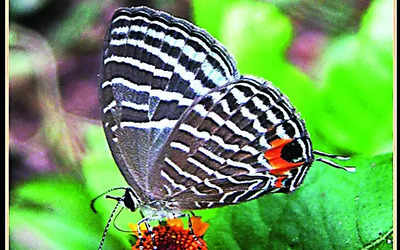[ad_1]

GUWAHATI: More than 446 butterfly species have been recorded in Assam‘s Kaziranga National Park (KNP), famed for the one-horned rhinoceros, making it a habitat with the second highest concentration in the country after the Namdapha National Park in Arunachal Pradesh, a park official said. The long-term observation and records are a culmination of years of work put in by a scientist from Kaziranga, Dr Monsoon Jyoti Gogoi.
The survey was conducted in different parts of the Kaziranga-Karbi Anglong landscape, especially in the Panbari Reserve Forest, which is home to a diverse range of butterfly species.
A new pictorial guidebook on butterflies, authored by Gogoi, documents 446 species of butterflies recorded in Kaziranga, 18 of which are new in the country.
The new records include Burmese Threering, Glassy Cerulean, Dark-bordered Hedge Blue, Andaman Yellow Banded Flat, Ferrar’s Cerulean, Great Red-vein Lancer, Peacock Oakblue, Singled-lined Flash, Yellow-tailed Awlking, White Palm Bob, Dark-dusted Palm Dart, Clavate Banded Demon, Pale-marked Ace, Yellow Onyx, Long-winged Hedge Blue, Ace sp, Hill Ace and Dwarf Banded Demon.
Gogoi, who has been studying butterflies in the region since 2007, said that Kaziranga now ranks second in butterfly species diversity among India’s protected areas, after Namdapha National Park.
This record is particularly significant given Kaziranga’s location is outside the Himalayan and Patkai mountain ranges, he added.
There is a need to raise awareness about the importance of butterfly conservation in Kaziranga by highlighting the rich diversity of species in the region, along with further research, monitoring, and habitat protection initiatives.
Meanwhile, the Chief Minister’s Office (CMO) congratulated Gogoi on X. “Dr Monsoon Jyoti Gogoi, a young lepidopterist from Kaziranga, has documented over 446 butterfly species, the second-highest in the country after Namdapha. HCM Dr.@himantabiswa extends his best wishes to Dr Gogoi for his remarkable contributions, which include 18 new records for India, such as the Burmese Threering, Glassy Cerulean, Dark-bordered Hedge Blue, and Andaman Yellow Banded Flat, further enriching India’s biodiversity research,” the CMO post said.
[ad_2]
Source link





